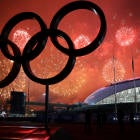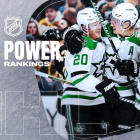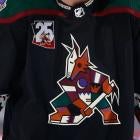As the torch was extinguished in Maracana Stadium signifying the end of the 2016 Olympic Summer Games in Rio de Janeiro, attention of "the movement" turns to the next big event on the Olympic schedule.
The 2018 Winter Games will be contested in PyeongChang, South Korea. We know that there will be some new events there like snowboarding big air and curling mixed doubles, but we don't know if the National Hockey League will allow its players to participate as well.
To put it bluntly, the logistical challenges that exist are mountainous. A vast time difference - 13 hours ahead of Eastern Time - the physical distance for travel and a number of other factors are going to play into the league's ultimate decision.
According to commissioner Gary Bettman, who has received renewed questions about the Olympics with the Rio Games coinciding with some media events for the forthcoming World Cup of Hockey, said that the league hasn't even really thought about PyeongChang yet. In fact, he said that it is unlikely the issue will even begin to be addressed until this winter.

When the World Cup kicks off on Sept. 17, the NHL is going to be monitoring just about everything. Revenue, of course, is the first and foremost. TV ratings will be a big factor, too. How it is received by the fans and players will be important. But even a successful World Cup is going to pale in comparison to the exposure, excitement and competition of the Olympics.
As noted, the World Cup of Hockey starts in less than a month. If you're a fan of the NHL, you undoubtedly know that. Now go ask your friends who are casually interested in hockey or just general sports fans if they even know it exists. Crickets, right?
If those friends are fans of Olympics or they just like cheering anything in red, white and blue, they probably knew when every swimming event was taking place, where to find it on TV and sat down and watched the whole thing start to finish and now has a really good Rowdy Gaines impression.
They won't watch a second of swimming for four more years.
But the Olympics have power over sports and non-sports fans alike in ways that no other event aside from the Super Bowl can hope to capture. Its scarcity is part of its allure, while nationalistic flag waving takes care of whatever isn't grabbing the audience.
The difference between the NHL and the events that we forget about for the years in between the Olympics is that you can find the league on your television every week. You can also see it immediately after the Olympics end. Meanwhile, the NHL is going to get more eyeballs on its biggest stars at a time of year where most casual fans have not yet tuned in.
When the American men played Russia in the preliminary round, the average audience was 4.1 million. It peaked at 6.4 million when T.J. Oshie and Jonathan Quick teamed up for a most memorable shootout, making Oshie a household name overnight. It was the most watched hockey game NBCSN has ever aired. And it was early on a Saturday morning in the U.S. due to the seven-hour time difference with Sochi.
For the semifinal against Canada, 3.9 million tuned in with a peak audience of 4.6 million.
NHL regular-season games around that time of year are going to max out around 1 million to 1.5 million viewers. The NHL would never deny that the Olympics bring unmatched exposure and TV ratings. The trouble has been converting it to a lasting audience.
The question for 2018 is does the NHL need the Olympics more than the Olympics need it or is it the other way around? The IOC, which has been dragging its feet on making some important concessions for the NHL, could make an argument that people would watch hockey with or without the NHLers.
The most watched hockey game of the 2014 Olympics in the United States was the women's hockey gold medal game between the USA and Canada. Obviously, championship games are going to bring in more viewers, but 4.9 million viewers nearly doubled the viewership of 2010's women's gold medal game. The Olympic rings and the USA across a jersey can be enough for fans who will watch most Olympic athletes whether they've heard of them or not.
The NHL also has to contend with this annual fact: The players, by and large, want to go. There's probably nothing the league could do to Alex Ovechkin that would stop him from representing Russia at the Olympics. Bringing a gold medal to his home nation is as important to him as bringing the Stanley Cup to Washington.
Sidney Crosby has two Stanley Cups now and plenty of other rewards, but the signature moment of his career has to be the gold-medal winner in Vancouver in 2010.
Before the Olympics, T.J. Oshie was a talented, but relatively unfamiliar player to a lot of people. He became a household name in the span of 15 minutes and remains so despite his being a player that is usually maxing out right around 50 points.

It definitely benefits the players more than it does the owners, who get next to nothing out of allowing their players to go to the Olympics. This is why NHL participation is at risk, especially with a host city that creates a lot of hurdles.
The time difference is going to loom largely over this decision. There's little doubt most games would be aired live and maybe recapped later, but a 7 p.m. game in PyeongChang would air at 6 a.m. in the East.
Then there's this major hang up, which could prove to be the killer. The IOC, at least for now, is pulling the plug on paying travel and insurance costs for NHL players to participate, which it has helped pay for before. It's a massive cost that was believed to be around $14 million from the IOC and an additional $18 million pitched in by the International Ice Hockey Federation in 2014. If the league or the independent national governing bodies for hockey have to pony up that cash, it's bad news for anyone hoping to see their favorite NHL players in Korea.
The ace in the hole for the IOC, however, is that the 2022 Winter Olympics have been awarded to Beijing. You better believe the NHL wants to showcase the sport in the world's most populous country. If the IOC is playing hardball, one wonders if they'd not welcome NHL players to Beijing without participation in PyeongChang. It's something to consider. Allowing the league to decide to send its players based on when it's beneficial to them seems like a poor precedent for the IOC to allow to be set.
Something else to consider is that the 2018 Winter Games is the last Olympics that falls within the NHL's partnership with NBC Sports as the exclusive U.S. TV rights holder for the league. The network would surely love to have NHL stars involved in the Olympics as two weeks of cross promotion opportunities, especially given the challenges of the time difference. But their influence could be waning by then as the NHL explores other media opportunities. After all, ESPN won the rights to the World Cup.
Despite all of the difficulty, if the NHL can get the IOC to budge on funding the insurance and travel costs - which is definitely the biggest hurdle left - they should go. You can't escape the power of the Olympics and even if the financial benefits are few, the marketing, good will and player exposure benefits remain large.
Having the nation's attention on hockey, even if it's only for two weeks, is something the league can't do on its own. Not even during the playoffs, which saw ratings decline this year by the way. Asking the owners to see past their bottom line is asking a lot, maybe too much, but there are few better freebies you can give fans than the two weeks of excellent hockey the Olympics provides.
As we say good bye to a memorable Summer Olympics in Rio, we can look forward 534 days to PyeongChang in hopes it will feature the best players playing in the best hockey tournament on the planet.






















